Taking steps to optimize your health by improving your diet, exercise regimen and sleeping patterns can dramatically improve your quality of life. And one key factor that can negatively influence all three of those areas is alcohol consumption. Unfortunately, for many people, quitting alcohol can be one of the most difficult lifestyle changes to implement.
That’s true even for people within healthy living and biohacking circles, and I’ll be the first to admit that there’s something to be said for enjoying a cold beer or a good glass of wine after a long day or work.
The problem is that chronic alcohol consumption, even in small amounts, can wreak havoc on your gut health and disrupt the restorative phases of your sleep.
When I began to fully realize the downsides to enjoying my daily glass of red wine, I started looking for alternatives. However, I quickly discovered that most of the alcohol alternatives on the market taste and feel nothing like the real thing.
Coincidentally, as part of my research into the best exogenous ketone supplements, I discovered that some of the products I tested tasted like alcohol.
Upon further inspection, I learned that a few of my favorite ketone supplements contain 1,3-butanediol (not to be confused with 1,4-butanediol), a type of alcohol that the liver converts into ketones (an energy molecule the body starts making in the absence of dietary carbohydrates) instead of toxins (as in the case of ethanol, the alcohol found in beer, wine and spirits).
Note that 1,3-butanediol is not to be confused with 1,4-butanediol, an industrial chemical intermediate that the DEA claims is used illicitly as a substitute to gamma-hydroxybutyric acid (GHB) — a Schedule 1 depressant that teens and young adults used in dance clubs in the 1990s. Any mention of butanediol throughout this article refers strictly to 1,3-butanediol!
Frank LLosa (the founder of my favorite ketone supplements brand KetoneAid) recognized that opportunity and designed a healthy ethanol alternative named Hard Ketones. It’s not only delicious, but it can actually improve your sleep and recovery.
And in case you’re wondering, Hard Ketones can also give you a nice buzz — just without the hangover.
In this review, I’ll explain why I decided to ditch regular alcohol and, instead, stock my pantry and fridge with Hard Ketones. I’ll also share how leveraging exogenous ketones before going to bed has improved my heart rate variability, as well as my sleep and recovery.
Hard Ketones
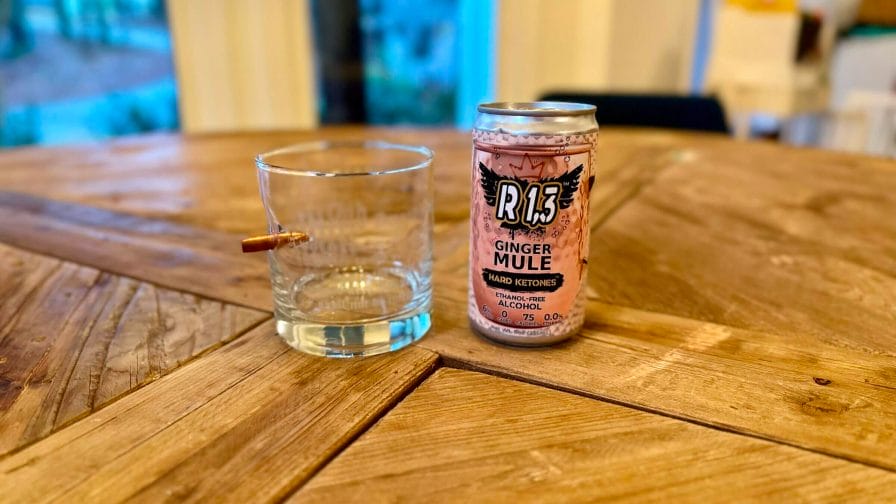
Summary
Hard Ketones is a healthy alcohol alternative that’s delicious and beneficial to your mental and physical health. Since ditching red wine in favor of Hard Ketones, I’ve seen dramatic improvements in my heart rate variability, sleep and recovery.
7 Reasons Why Regular Alcohol (Ethanol) Is Bad for Your Health
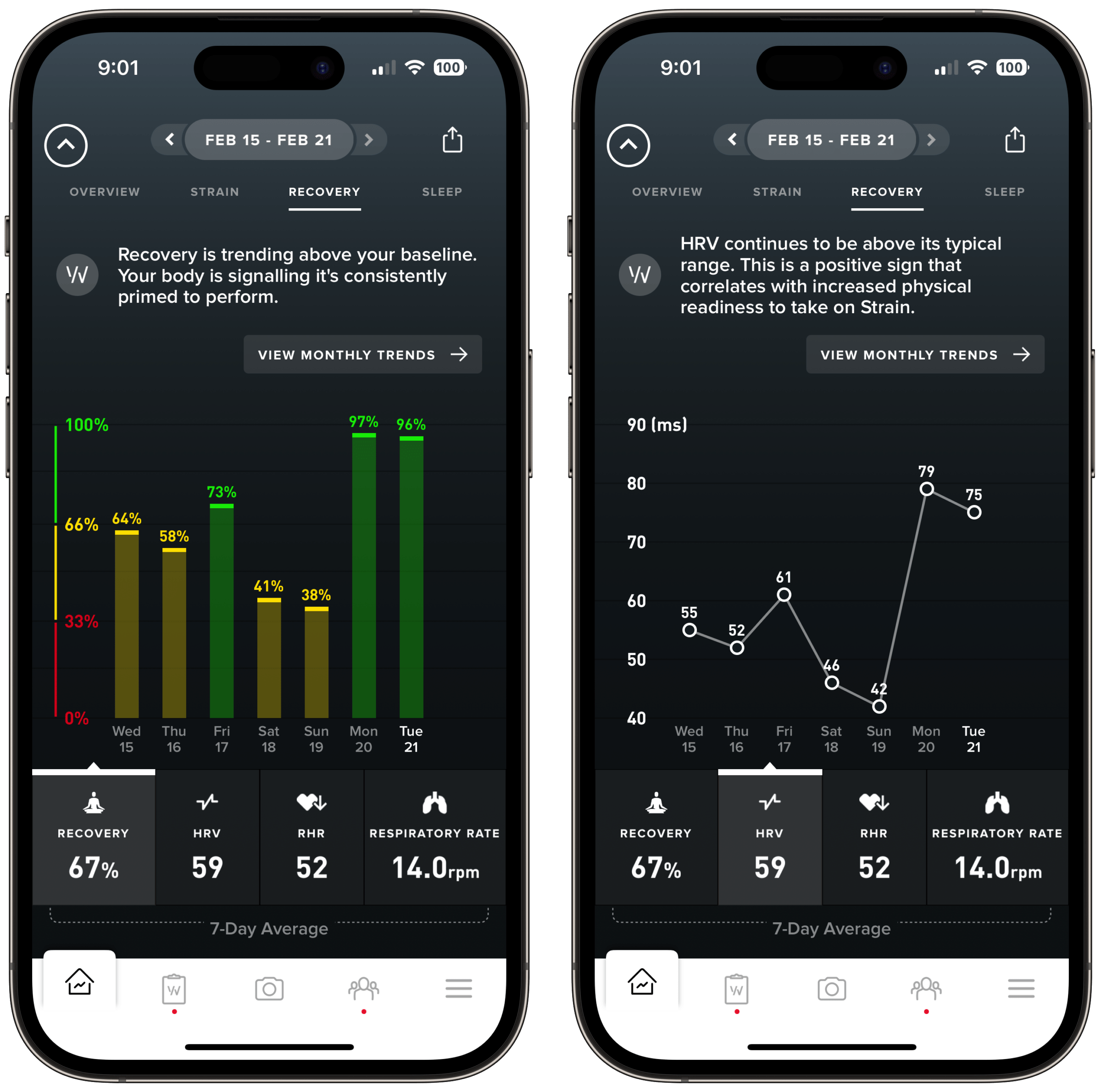
There are different types of alcohol, including some you might already be familiar with: methanol, isopropanol and ethanol. The latter is an integral part of all of the alcoholic beverages we consume, and is also known as ethyl alcohol, drinking alcohol, grain alcohol or, simply, alcohol.
The problem with ethanol is the toxins that are created when it’s metabolized by the liver.
The good news is that if you’re among the few people who are metabolically healthy (only ~12% of Americans are), the occasional drink won’t harm you much. After all, your body has built-in pathways to deal with toxins.
Unfortunately, most of us are overloaded with environmental toxins from the food we eat, the water we drink and the air we breathe. That pushes our body’s detoxification system to its limits, making chronic alcohol consumption (even in small amounts) a potentially serious problem.
Here are seven reasons why ethanol is bad for your health.
- Gut damage. Alcohol damages the delicate lining inside your gut, causing leaky gut, which allows endotoxins and undigested food particles to enter your bloodstream. That leads to inflammation, as your immune system responds. Alcohol also disrupts your gut microbiome, leading to dysbiosis.
- Liver damage. When endotoxins enter the bloodstream, they pass through to the liver, where they cause inflammation, oxidative stress, and the accumulation of fat tissue (leading to fatty liver disease).
- Brain damage. Chronic Alcohol consumption causes alterations in brain neurons, such as reductions in their size. This increases your risk of mental health issues in the long run.
- Low testosterone. Alcohol increases aromatase expression in the liver, leading to lower testosterone and IGF1, and higher estrogen levels.
- Depletes nutrients. Similar to the antinutrients found in most plant foods, alcohol inhibits the absorption and usage of vital nutrients, such as thiamin (vitamin B1), vitamin B12, folic acid and zinc.
- Disturbs sleep. While consuming alcohol before bedtime may help you fall asleep quicker, it disrupts your sleep cycles (including your deep and REM sleep) and tissue recovery, causing you to wake up tired in the morning. That’s because the metabolites of alcohol act as stimulants that can limit the time you spend in the restorative sleep phases.
- Causes anxiety. While alcohol can initially create GABA (an anti-anxiety neurotransmitter), in the long-term alcohol reduces the number of GABA receptors, causing overexcitation and anxiety.
In contrast, butanediol has none of those downsides because the liver converts it into ketones, the preferred fuel source of the brain and the heart.
When you’re fueled with ketones, you experience improved mental performance and recovery (as I explained in my article about the best exogenous ketone supplements). However, it’s worth noting that if your goal is to improve your mental performance, I’d stick to products containing ketone esters (KetoneAid’s KE4 Pro) instead of butanediol, because the latter can give you a mild buzz and you wouldn’t want to show up for work or your final exam feeling like that.
Another positive side effect of ketones is that they suppress your appetite. So you feel less hungry and are less likely to overeat (something you want to avoid in the evening, because it disrupts your sleep).
A Note on Alcohol and the Ketogenic Diet
Despite my appreciation for low-carb eating, I didn’t write this article with the ketogenic diet in mind. Instead, I wanted to create awareness about healthy alcohol alternatives that taste like the real thing.
However, consuming alcohol while on a ketogenic diet is a hot topic, so I wanted to address it.
In a nutshell, you can get away with consuming small amounts of certain types of alcoholic beverages (e.g., dry wines or clear spirits) without getting kicked out of ketosis — but you’ll likely experience reduced ketone production if you do.
On the bright side, you’re likely to be more sensitive to the effects of alcohol on a ketogenic diet, so a glass of wine might be enough to give you a buzz without experiencing a hangover the next day.
But my view is that ethanol isn’t an ideal choice if you’re trying to reap the most benefits from the keto diet. Aside from all the issues associated with ethanol that I listed above, many alcoholic beverages (e.g., beer or sweetened cocktails) can kick you out of ketosis — or at least negatively impact ketone production.
That’s why I think butanediol is the best keto alcohol available: your body converts it into ketones, whereas ethanol can kick you out of ketosis. As a result, I highly recommend Hard Ketones if you’re on keto but would like to enjoy the occasional drink.
Hard Ketones Review
Pros
- Tastes like real alcohol (because it is).
- 100% ethanol free.
- Raises blood ketone levels.
- Relatively clean ingredients.
- Suppresses your appetite.
- Has improved my HRV, recovery and sleep.
Cons
- Price.
- Comes in a can. While most cans no longer have BPA linings, there’s little known about the health impacts of the substitutes being used.
Hard Ketones is a delicious carbonated beverage that includes 12.5 grams of R 1,3 Butanediol with zero grams of fat, protein or carbs. I’ve been using Hard Ketones for several months as a healthy alternative to regular alcohol.
What Does Hard Ketones Taste Like?
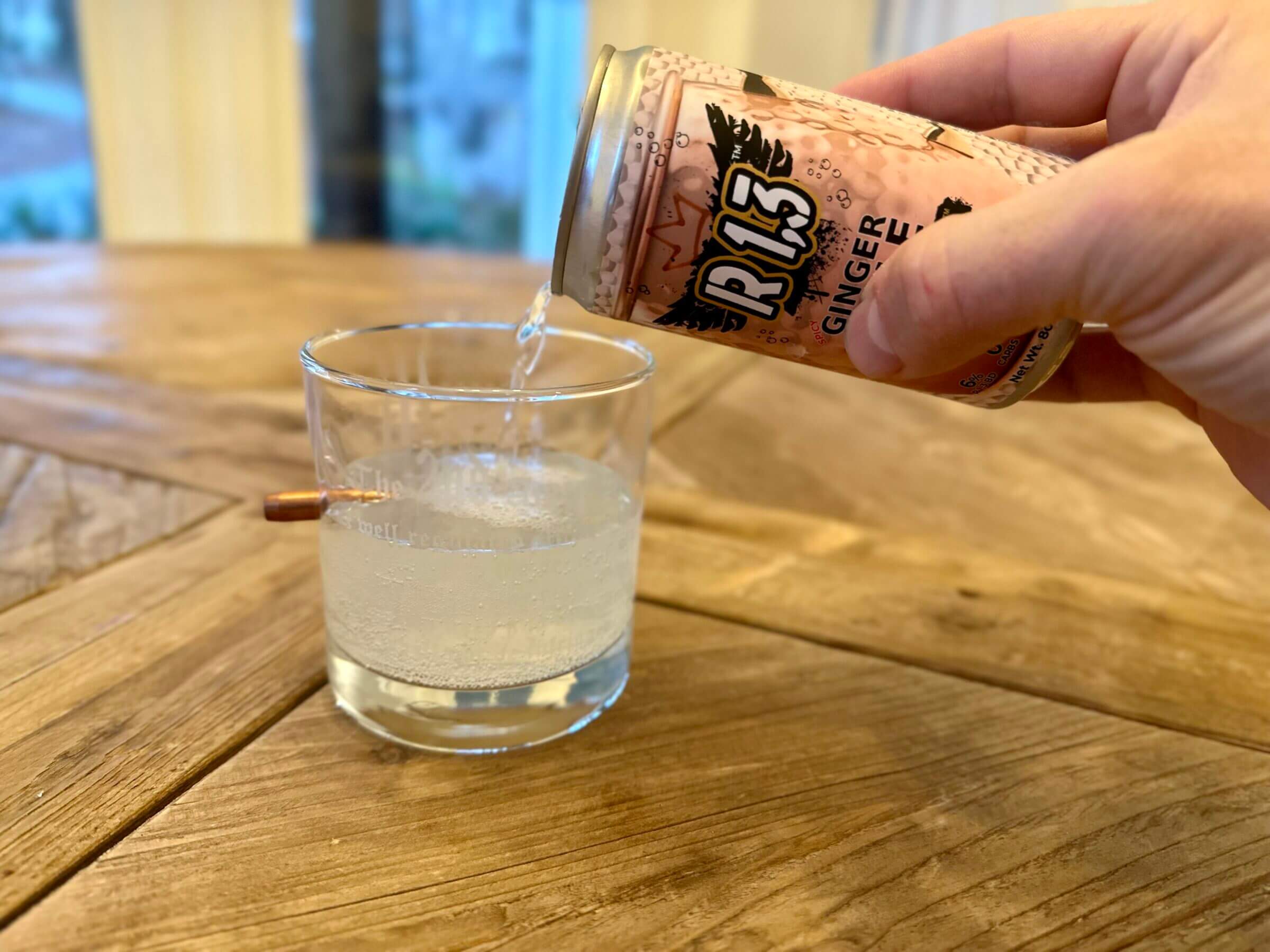
Arguably one of the most important aspects of any alcohol alternative (besides the ingredients) is how the beverage tastes. After all, if what you’re drinking doesn’t taste anything like actual alcohol, you’ll probably go back to the real thing sooner rather than later.
That’s why I’ve never even bothered with botanical concoctions that aim to mimic alcoholic beverages.
Hard Ketones tastes like real alcohol because it contains butanediol (a non-toxic type of alcohol). So when you sip a can of Hard Ketones Piña Colada or Ginger Mule, you feel like you’re having a real drink.
I found both Hard Ketones flavors absolutely delicious, but my wife preferred the Piña Colada flavor.
In fact, if you drink enough Hard Ketones, you’ll probably feel a light buzz (depending on your sensitivity to butanediol). I’ve never had more than four cans, and never felt anything remotely like intoxication — even when I consumed a can on an empty stomach. By that I mean, I haven’t experienced cognitive impairment such as slurring words and bumping into tables (like biohacking legend Tim Ferris has).
Scientists believe that D-β-Hydroxybutyrate (a ketone body) increases ATP levels in dopaminergic neurons (the main source of dopamine in the mammalian central nervous system). In other words, consuming Hard Ketones can trigger a rise in dopamine, causing the same initial euphoric effects as regular alcohol.
I find that consuming Hard Ketones triggers the same calming and relaxing effects as a glass of wine. For that reason, I don’t recommend consuming Hard Ketones before a workout.
Hard Ketones Ingredients
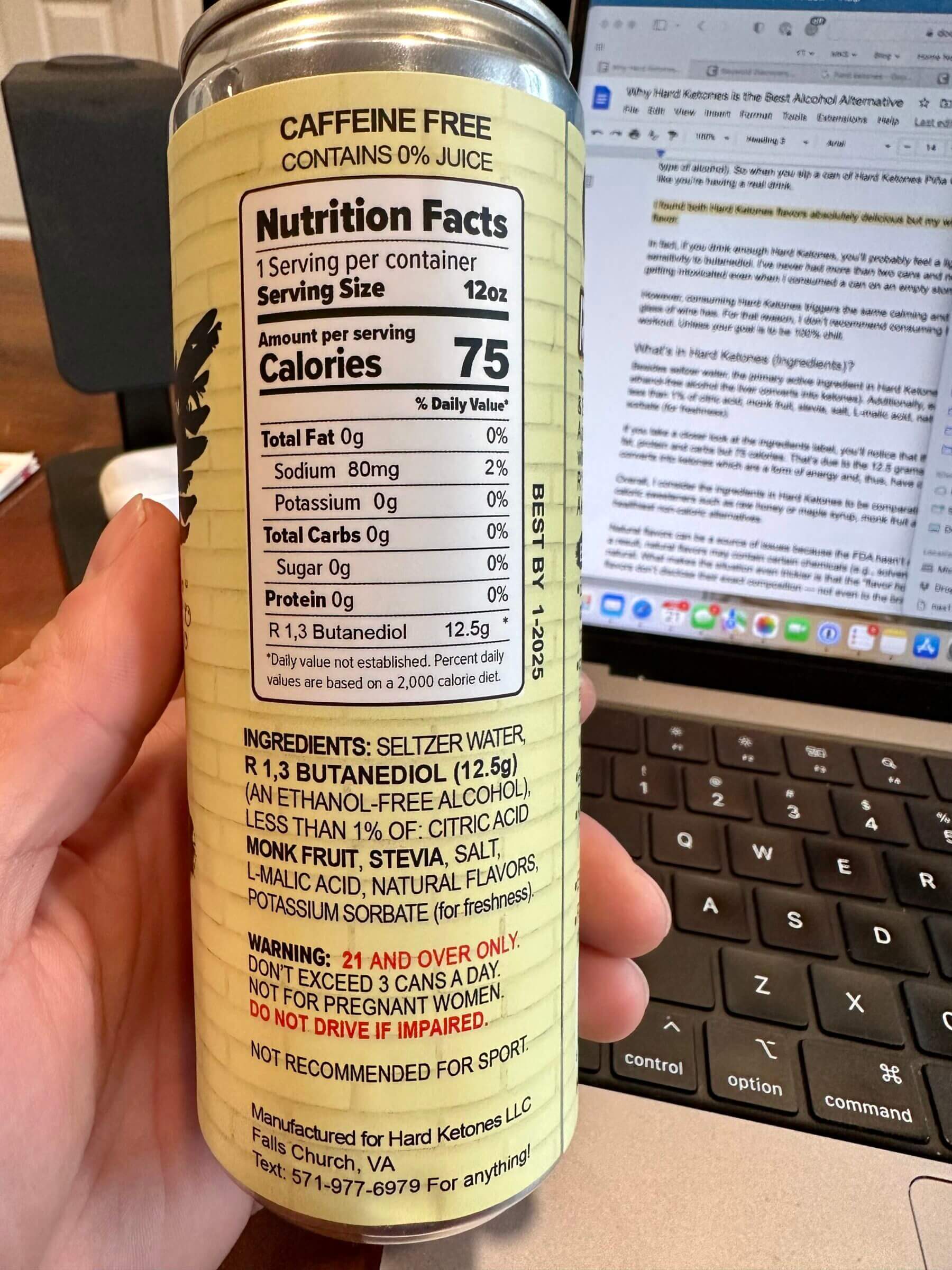
Besides seltzer water, the primary active ingredient in Hard Ketones is R 1,3 Butanediol, an ethanol-free alcohol the liver converts into ketones. Additionally, each can of Hard Ketones has less than 1% citric acid, monk fruit, stevia, salt, L-malic acid, natural flavors and potassium sorbate (for freshness).
If you take a closer look at the ingredients label, you’ll notice that the drink has zero grams of fat, protein or carbs, but it does have 75 calories. That’s due to the 12.5 grams of butanediol, which the body converts into ketones.
Ketones are a form of energy, and are thus measured in calories.
Overall, I consider the ingredients in Hard Ketones to be comparatively clean. In the absence of caloric sweeteners such as raw honey or maple syrup, monk fruit and stevia are probably the healthiest non-caloric alternatives.
Natural flavors can be a source of issues because the FDA hasn’t defined the term “natural.” As a result, natural flavors may contain certain chemicals (like solvents) that are anything but natural.
What makes the situation even trickier is that the “flavor houses” that design those flavors don’t disclose their exact composition — not even to the brands that use them.
However, I’d argue that the potential risks of consuming trace amounts of “natural” flavors are lower than the risk of consuming regular alcohol. The same principle applies to preservatives such as potassium sorbate. Of course, it’d be best if you didn’t consume either. But if you have to choose between regular alcoholic beverages and Hard Ketones, I’d go for the latter.
Hard Ketones Pricing
A 12-pack of Hard Ketones (containing 12 fluid ounces each) retails for $79. While that’s much more expensive than two six-packs of beer, it’s reasonably priced considering it’s a high-quality exogenous ketone supplement that can not only replace regular alcohol, but which also offers several health benefits.
To reduce the price per serving to a palatable $4.90 (from $6.50), I signed up for a subscription (which knocks 10% off the purchase price) of 48 cans to be delivered every six months.
At $4.90 per can, the cost is almost certainly less than you’d pay for a beer at a restaurant or bar.
In case you’re wondering, KetoneAid doesn’t sell Hard Ketones on Amazon. However, you can find many of KetoneAid’s other products on Amazon.
How Hard Ketones Has Improved my HRV, Recovery and Sleep
If you’ve been following me for a while, you know that I enjoy tracking and trying to improve my heart rate variability (HRV) and sleep by keeping tabs on how certain lifestyle choices influence those metrics.
One of the tools I use to correlate lifestyle choices with changes in HRV and sleep quality is WHOOP — a sophisticated health and fitness tracker. Read my WHOOP review to learn more about how it works.
If you’re not familiar with the importance of heart rate variability, I recommend you check out my article on all the things I’ve done to improve it. In a nutshell, HRV is an excellent proxy of how your nervous system is handling stress.
A relative drop in HRV (during deep sleep) is often a good indication that your body is struggling to recover from the stressors (e.g., exercise, stress, illness, etc.) of the previous day.
One of the things I discovered immediately after logging my alcohol consumption in WHOOP was the dramatic impact alcohol consumption had on my heart rate variability and sleep performance.
Specifically, I noticed less deep and REM sleep, a lower HRV, and a higher resting heart rate compared to my baseline. That was a clear indication that alcohol was causing undue stress, and that recovering from alcohol consumption took away resources my body could have used to repair tissue, prune damaged neural connections and make new ones or consolidate memories (to name a few of the maintenance processes happening while you sleep).
Additionally, waking up less recovered the next morning led to reduced mental and physical performance, as well as an increased risk for injury.
I noticed dramatic changes in those health metrics almost instantly when I began substituting Hard Ketones for regular alcohol. On nights following the consumption of butanediol, my heart rate variability spiked dramatically, while my REM sleep increased. I also noticed vivid dreams while sleeping those nights, a sign that my brain was busy consolidating memories (which usually happens during REM sleep).
The other benefit of supplementing with ketones is that they’re appetite-suppressing, which means you might actually eat less. That’s in contrast to ethanol, which stimulates your appetite and might cause you to overeat.
Needless to say, having a big meal before bed isn’t conducive to good sleep quality.
How Does Hard Ketones Compare to Traditional Non-Alcoholic Beverages?
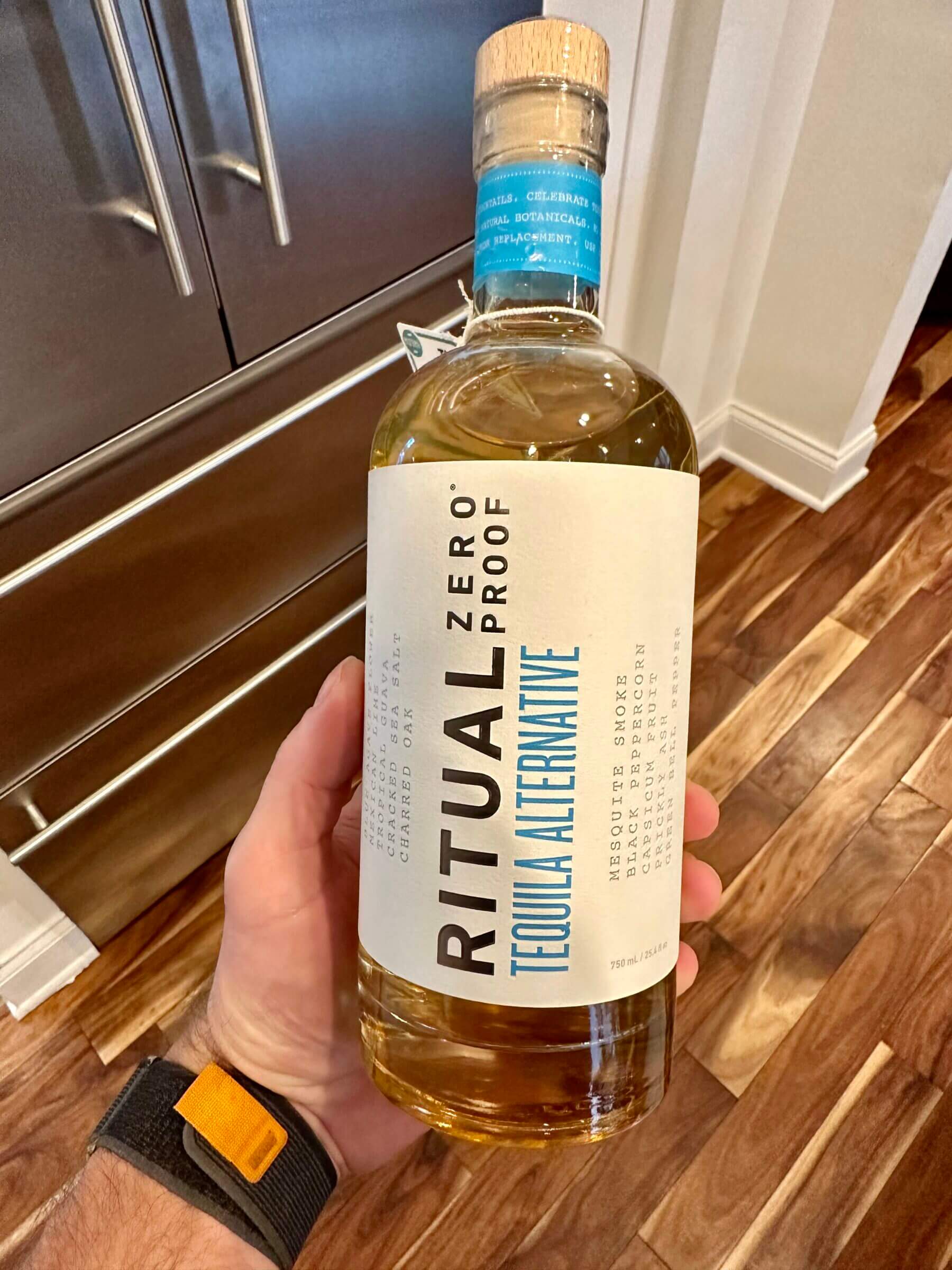
There are different types of non-alcoholic spirits, based on how they’re made.
Traditional non-alcoholic drinks, such as non-alcoholic beer, undergo regular fermentation before their alcohol is removed (or greatly reduced). As a result, many of those beverages still have residual amounts of alcohol, which is why the better term to describe them might be low-alcohol beverages.
Additionally, they still contain mostly empty calories, in the form of carbohydrates (from the grains), which aren’t conducive to optimal health.
Other types of alcohol-free drinks don’t contain any alcohol whatsoever. Instead, they’re soft drinks made with soda water, kombucha, fruit juice (e.g., grapefruit), herbs (e.g., cardamom, ginseng, green tea), bitters and adaptogens from fungi such as ashwagandha or reishi mushrooms. These substances can, to some degree, mimic the taste (and burn) of real alcohol.
Examples of brands that manufacture such drinks include Ritual Zero Proof, Curious Elixirs, Seedlip, Kin Euphorics and Mocktails.
Out of those five, I think Ritual Zero Proof makes a reasonable product. It doesn’t really taste like tequila, but if you close your eyes, you might be tricked into thinking it’s alcohol.
That said, I don’t think I’ll order another bottle because I’m not a fan of the xanthan gum and sodium benzoate the company adds to their beverages. Scientists suspect the latter to have endocrine-disrupting properties, which can negatively impact your fertility, impede your weight loss efforts and more.
I don’t consider any of the other products to be real alcohol alternatives. Instead, they’re either made with flavored sparkling water or a concoction of herbs that might mimic a digestive aid but not a traditional cocktail.
Frequently Asked Questions
Yes. Hard Ketones contains a type of alcohol that can give you a buzz by triggering the reward center of the brain and causing a rise in dopamine levels (similar to ethanol). However, the liver converts the butanediol in Hard Ketones into ketones instead of toxins, so you won’t experience a hangover after consuming Hard Ketones.
According to the company behind Hard Ketones, many of its users have reported varying degrees of cognitive impairment after consuming the product. However, I have never noticed any of the classic signs of alcohol intoxication, such as slurred speech or trouble keeping my balance — even after drinking up to four cans of Hard Ketones. So your mileage may vary.
Even though Hard Ketones has calories, I don’t consider exogenous ketones to be a fast-breaker, because they don’t negatively impact autophagy, ketosis or insulin sensitivity (my primary fasting goals). In fact, if the extra ketones can help you extend your fast or feel better while fasting, then go for it. I leverage exogenous ketones during extended fasts all the time.
While some brands market their exogenous ketone supplements to fitness enthusiasts, I don’t recommend using butanediol before workouts or competitions because of the calming effects the alcohol has. If you’re looking for extra fuel before intense physical activity, I recommend a real ketone ester, such as KetoneAid’s KE4 Pro, which I reviewed as part of my article covering the best exogenous ketone supplements.
Of course, you can leverage Hard Ketones at night to improve your recovery (as I have been).
My initial reaction was to not give Hard Ketones to our kids, because 1,3 butanediol is a type of alcohol. However, considering that butanediol doesn’t have the same intoxicating effects as ethanol, and the 1984 National Minimum Drinking Age Act doesn’t prohibit me from doing so, I let both of my kids (aged seven and nine) take a sip. They didn’t like the taste and never asked to try again.
KetoneAid recommends avoiding Hard Ketones if you’re pregnant or breastfeeding for liability reasons. I have not seen any scientific evidence suggesting that butanediol is detrimental to the mother’s health, but the founder of Hard Ketones suggested that fetuses and babies don’t have the enzyme required to break down the butanediol molecule. To be on the safe side, I’d avoid consuming Hard Ketones if you’re pregnant or breastfeeding.
No, Hard Ketones doesn’t contain caffeine or other stimulants. So you can consume Hard Ketones before bedtime without disrupting your sleep. If you’re looking for a healthy energy drink substitute, check out KetoneAid’s Snake Water, an alcohol-free beverage that contains a combination of ketone ester and nootropics. That’s what I’ve been using during the day to achieve peak mental performance.
Considering that Hard Ketones doesn’t contain ethanol, it falls under the “non-alcoholic drinks” category. As a result, I’d say you can safely consume it without breaking the rules.
Your brain and other organs don’t discriminate with regard to where the ketones are coming from. If you’re on a low-carb diet and your body makes its own ketones (a metabolic state known as ketosis), you’ll likely achieve the same benefits as far as mental clarity and improved recovery are concerned. But if you consume alcohol (ethanol), you’ll likely undo many of the benefits a keto diet offers.
No, Hard Ketones doesn’t cause a rise in blood sugar levels because it has no calories from carbs, protein or fat. In fact, studies have shown that exogenous ketones can decrease blood glucose levels.
Based on my testing, a can of Hard Ketones raised my blood ketone levels by 1 mmol/L. That’s similar to what MCT oil can do, but with much fewer calories.
No, Hard Ketones contains only R 1,3 Butanediol. If you’re looking for a delicious beverage that contains D-BHB, check out KetoneAid’s Snake Water.
Yes, any high-quality exogenous ketones can help mitigate the symptoms of the keto flu. However, I’d argue that increasing your salt intake is more important than using exogenous ketones. If you’re currently suffering from the keto flu, I recommend getting high-quality electrolyte supplements, such as LMNT (the one we use here at the Kummer household) and using KetoneAid’s KE1, which contains a blend of ketone ester and salts.
I strongly advise against doing so. While the law doesn’t recognize R 1,3 Butanediol as alcohol, you could still get a DUI if you show signs of intoxication or are cognitively impaired.
Hard Ketones: The Best Alcohol Alternative
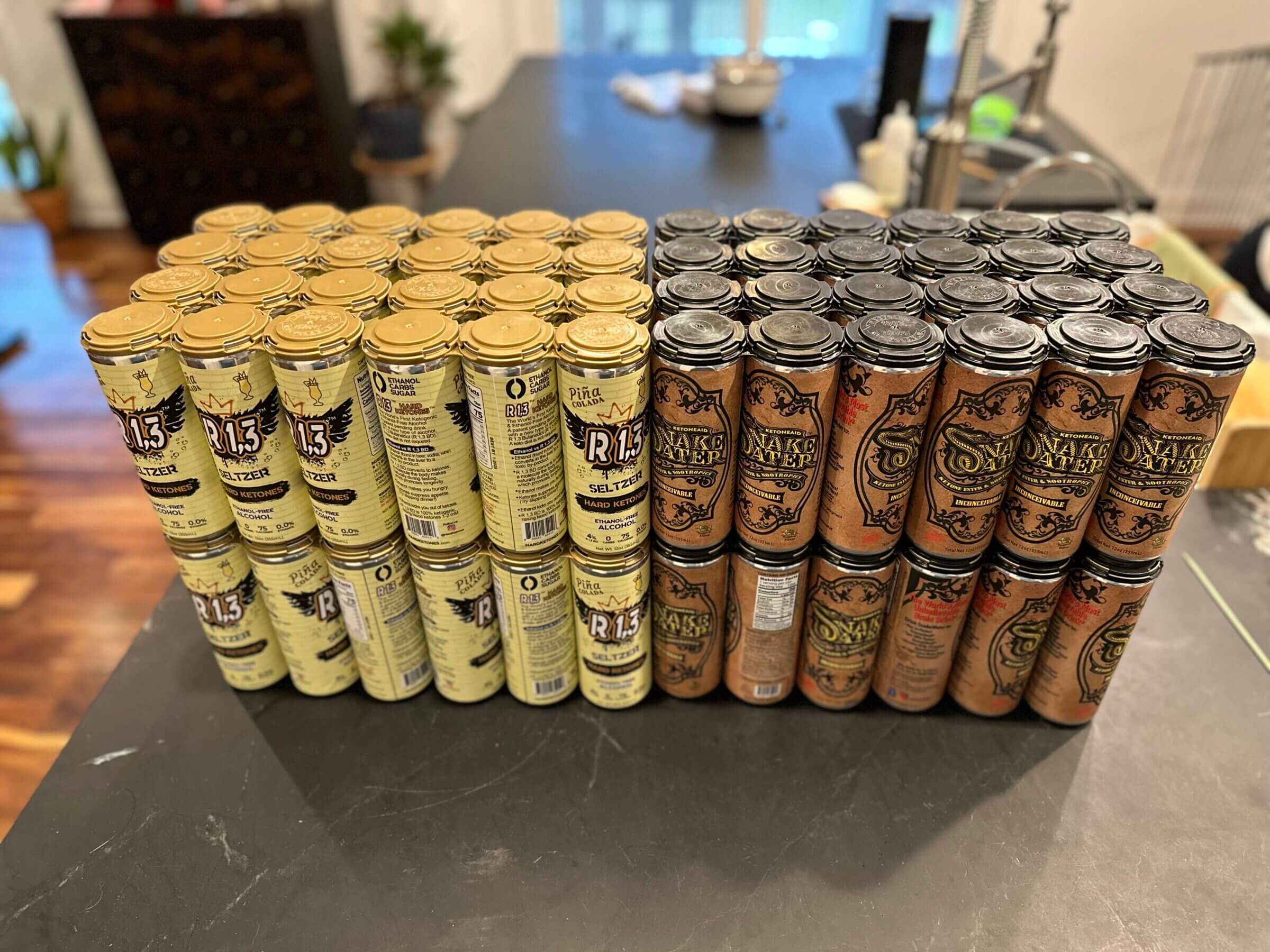
Alcohol is one of the few drugs for which people think something is wrong with you when you quit. That’s likely because most people are under the misconception that alcohol isn’t a problem until you show signs of addiction or liver damage.
I never considered my social alcohol consumption an issue until I started realizing how even a glass or two of red wine in the evening impacted my sleep and certain biomarkers, including my heart rate variability. Even worse, I’ve seen my biometrics remain negatively impacted for several days after nights I dared to have a third glass of wine.
Now that I better understand what alcohol (and ethanol to be more specific) is doing to my health, I’ve dramatically reduced my intake. It’s not that I’ll never have regular alcohol again (I still enjoy the occasional glass of wine or homemade margarita), but not on a regular basis anymore. Instead, if I feel like I want to enjoy a cold drink in the evening to settle down after a stressful day at work, I’ll grab a can of Hard Ketones.
It’s a delicious beverage that supplies optimal fuel to my brain and other vital organs, such as the heart. As a result, I recover faster and sleep better, without having to consume the plant-based ingredients of other alcohol alternatives (which have the potential to irritate my gut).
Have you tried alcohol alternatives in the past? If so, let me know in the comments what products you tried and how you liked them!

Michael Kummer is a healthy living enthusiast and CrossFit athlete whose goal is to help people achieve optimal health by bridging the gap between ancestral living and the demands of modern society.

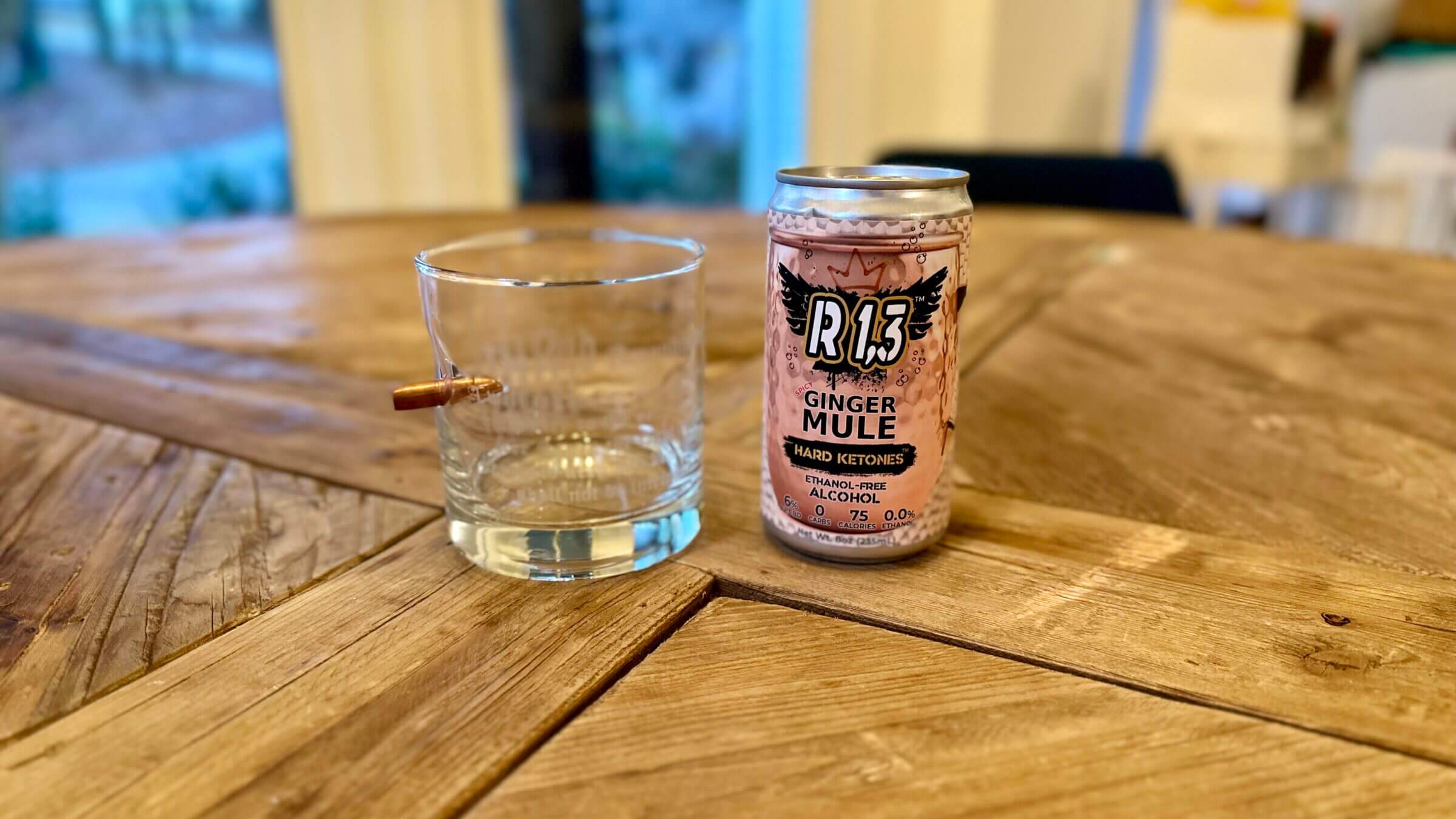

I have been a loyal customer of Hard Ketones for more than a year. I drink one to two every day, between meals. I have found the consistent benefit in this great alcohol-alternative not only in the flavor, which is great, but also in the calming effects. When I drink two servings I get a nice mild alcohol-like buzz. I do not get any kind of hangover effect and feel no need to drink more than two a day. I am a very happy customer and supporter!
Big fan of this drink and grateful it is available!
Thanks for sharing your feedback, I much appreciate it!
Question,can you consume hard ketones seltzer on a daily basis?
Hey Victor,
I don’t see a reason why not. I mean, I would center my hydration around fresh (or filtered) water but don’t see any issues with having a can of Hard Ketones daily.
Cheers,
Michael
I ordered 12 and forgot totally about them. Do they expire? Destabilize into some dangerous? thanks
I’m sure they expire at some point (you can probably find a best by date on the bottom of the can) but I doubt they’ll break down into toxins (Hard Ketones wouldn’t be allowed to sell them to the public if they did).